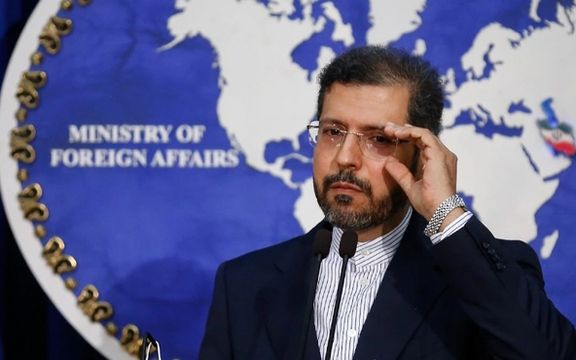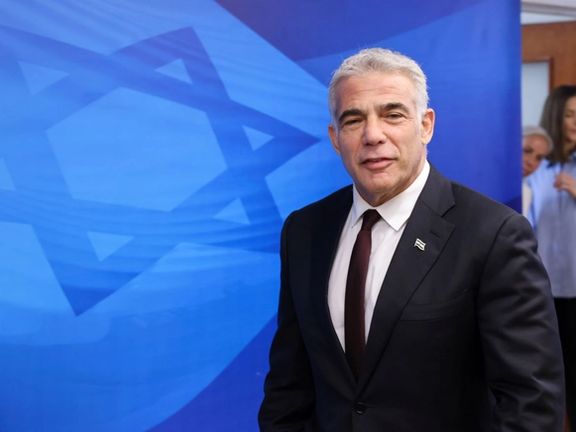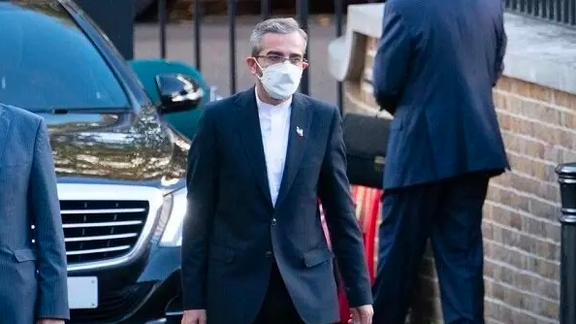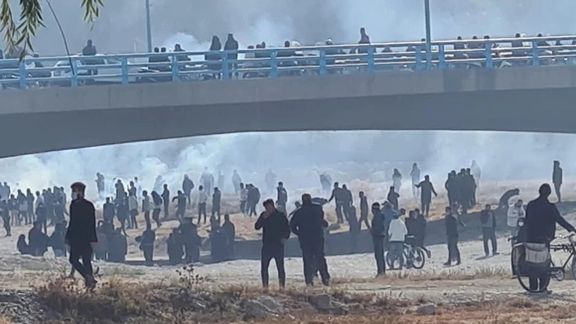Israeli PM Warns Over Iran Nuclear 'Blackmail'

Israel's prime minister on Monday called on world powers not to "give in to Iran's nuclear blackmail" as negotiations commenced in Vienna.

Israel's prime minister on Monday called on world powers not to "give in to Iran's nuclear blackmail" as negotiations commenced in Vienna.
Naftali Bennett said in a video statement that was delivered to representatives of nations opening negotiations with Iran that Tehran seeks "to end sanctions in exchange for almost nothing" and keep its nuclear program intact while receiving hundreds of billion dollars once sanctions are lifted.
The video was obtained by the Associated Press.
Negotiators from Iran and world powers were meeting in Vienna on Monday to resume talks aimed at reviving a 2015 nuclear deal.
Iran has ramped up its uranium enrichment since the United States withdrew from the Joint Comprehensive Plan of Action (JCPOA) in 2018.
Israel vocally opposed that agreement, and Israeli officials now say Tehran is closer than ever to developing nuclear arms, something it will not abide.
Israeli Foreign Minister Yair Lapid is visiting London and Paris this week to discuss Iran with British and French officials, and Defense Minister Benny Gantz will head to Washington this week with the same aim.
Iran insists its nuclear program is for peaceful purposes only. It has blamed the breakdown of the agreement on the Trump administration's decision to withdraw from it and restore crippling sanctions.
Report by AP

Iran said Monday that the "real sides" in Vienna nuclear talks should make a deal with Tehran because the window of opportunity "will not remain open forever".
"Americans wasted our time in the [previous] six rounds of talks to preserve Trump's failed legacy," Foreign Ministry Spokesman Saeed Khatibzadeh told reporters at his regular weekly press conference on Monday. He was referring to Trump's 'maximum pressure' sanctions adding that the "real sides", presumably the United States and its western allies, should make use of the open window of opportunity because it will not remain open forever.
"Talks will go in the right direction if the US comes to the scene to resolve the impasse [in the talks]," Khatibzadeh said while reiterating that that the US is responsible for both abandoning the 2015 agreement, the Joint Comprehensive Plan of Action (JCPOA) and imposing sanctions on Iran.
Indirect negotiations with the US that Iran suspended in June resume Monday afternoon in Vienna after a five-month hiatus. Expectations of a breakthrough are low as Iran has considerably boosted its uranium enrichment during this time and claims to come to the talks with "full hands". Tehran has stockpiled 20-percent and 60-percent enriched uranium, mostly this year after the Biden Administration said it is ready to return to the JCPOA.
"We will be in a difficult place if the US is not coming to Vienna for resolving the impasses," he said and added that the US can get the "ticket for returning to the JCPOA room" only if it intends to lift its sanctions on Iran.
In the meantime, Tehran has hardened its negotiating position, demanding that all US sanctions imposed since 2018 to be removed “at once”. It is also demanding a guarantee from Washington that no future US government can pull out of agreements made with Iran. This poses a particularly difficult issue for the Biden Administration, which constitutionally cannot offer such a guarantee.
Iran's chief negotiator Ali Bagheri-Kani Sunday met with top Russian and Chinese negotiators as well as the deputy foreign policy chief of the EU, Enrique Mora.
"The makeup of the Islamic Republic's negotiating delegation reflects this resolve and seriousness for taking serious steps towards the removal of the US' sanctions against the Iranian people," Bagheri-Kani told reporters in Vienna Sunday. The team is mainly composed of financial rather than political officials as in the previous nuclear talks.
In his press conference Monday, Khatibzadeh alleged that some European parties "are seeking to prolong" the talks and criticized the publication of a joint article by the UK Foreign Minister Liz Truss and Israel’s foreign affairs minister Yair Lapid in The Daily Telegraph Sunday in which they said Britain and Israel will "work night and day" in preventing Iran from becoming a nuclear power.
"When you see the UK foreign minister write a joint article with the party that from day one has made every effort to prevent the signing of the JCPOA, to destroy it, and is still the main opponent of talks in Vienna to revive it, when you see this arrangement, you realize that at least some European countries are not coming to Vienna with the will required for lifting of sanctions," Khatibzadeh said.
Khatibzadeh also repeated Iranian claims that talks with Rafael Grossi, the head of the UN nuclear watchdog, IAEA, last week in Tehran had been left incomplete "because we did not reach a definitive agreement on some words and concepts that were important to both" but said the agreed clauses were "almost finalized".
Grossi has reported back to the IAEA Board of Governors that his agency cannot fully monitor Iran’s nuclear activities because of Tehran’s lack of cooperation.
Iran reduced IAEA’s monitoring access earlier this year when it intensified its uranium enrichment, further complicating the Vienna talks.

Hardliners in Iran call the new negotiating team sent to Vienna “revolutionary forces”, and pouring scorn on the United States, while also attacking Israel.
The spokesman for Iran’s armed forces said Sunday that Tehran will continue to strive for Israel’s destruction, adding that there is no way to come to terms with the United States.
General Abolfazl Shekarchi said that annihilating Israel is the Islamic Republic's biggest objective, reported the state-owned news agency ISNA on Sunday, November 28. He explained that the Iranian armed forces see Israel as a part of "international Zionism." Shekarchi further claimed that "Even Muslim countries that help Israel are part of the Zionist regime."
Meanwhile, Shekarchi stressed that there is no way Iran could compromise with America, adding that "Regrettably, some people in Iran believe we can come to terms with the United States as the Great Satan while America would never step back from its position of plundering the resources of the oppressed nations."
Speaking one day before the resumption of negotiations to revive the 2015 nuclear deal, he said "How can we come to terms with a country that looks at itself as the master and sees other nations as slaves? Making any compromise with such a country would undermine all our religious and revolutionary ideals."
Shekarchi said, "America's presence in this region is illegitimate. Our presence in the Red Sea or Syria is aimed at restoring security, but America is not in this region to restore security." He claimed, "This region will be insecure as long as the United States is present here. Its presence in this region cannot be tolerated by Iran or other regional nations."
The spokesman added that in his view "America's allies think like America but they have less power." He called US officials "Very Foolish" and at the same time called the UK and France "lesser Satans."
As the Iranian delegation is in Vienna to take part in negotiations with JCPOA partners and hold "indirect talks" with the United States, hardline media in Iran have renewed their attacks on the United States with a new momentum. Shekarchi's statements are part of this media blitz.
Hardline daily Kayhan, funded by Supreme Leader Khamenei's office, even went as far as accusing the United States of being behind recent protests in Esfahan and called the protesting farmers who were attacked by IRGC shotguns on Friday "the United States' foot soldiers." Meanwhile, in a commentary the daily reminded Iranian negotiators that their talks with the West begin on the anniversary of the killing of Iranian nuclear scientist Mohsen Fakhrizadeh who was assassinated in Tehran a year ago purportedly by Israeli agents.
The IRGC-linked newspaper Javan also carried two stories against the negotiations and the United States on its front page on Sunday. The leading story refers to threats made by Washington of having other options if the Vienna talks fail and argues that "America has new plans and the statements made by US diplomats and other officials indicate that Washington has forgotten about the JCPOA. Their negotiators talk about total prevention of oil sales by Iran and bombing Iran's nuclear establishments."
Javan's commentary on the negotiations also claims that the US delegation's agenda is exerting redoubled pressures on Iran. The commentary points out that the United States is not directly involved in the talks but says Washington is planning to use other Western partners of the JCPOA, i.e., the Europeans, to exert pressure on Iran.

Britain and Israel will "work night and day" to prevent Iran from becoming a nuclear power, the foreign ministers of the two countries wrote in a joint article.
"The clock is ticking, which heightens the need for close cooperation with our partners and friends to thwart Tehran's ambitions," the UK's Liz Truss and her Israeli counterpart Yair Lapid wrote in the Telegraph newspaper on Sunday.
Lapid is visiting Britain in what Israeli media last week said is part of Israel’s diplomatic push to warn allies of the dangers of concessions to Tehran.
Israeli Prime Minister Naftali Bennett said earlier in the day that his country was "very worried" that world powers will remove sanctions on Iran in exchange for insufficient caps on its nuclear program, as negotiators convene in Vienna on Monday in a last-ditch effort to salvage a nuclear deal.
Meanwhile, Israel and Britain will sign a 10-year agreement on Monday to work closely on areas such as cybersecurity, technology, trade and defense, according to the Telegraph.
The foreign ministers added in the article that Israel will officially become Britain's "tier one" cyber partner, in a bid to improve its cyber defense as countries around the world face increased threats.
Report by Reuters

The heavy presence of financial officials in Iran's new negotiating team highlights Tehran’s focus on lifting US sanctions in talks starting in Vienna, Monday.
"Actions now matter more than mere words. We should be offered a clear and transparent mechanism to ensure that sanctions will be removed," Iran's chief negotiator, Ali Bagheri-Kani wrote in an op-ed in the Financial Times Sunday about Iran's approach to the talks in Vienna.
"We will be starting these new discussions under circumstances influenced by the unfortunate fate of the JCPOA," he wrote, referring to US president Donald Trump's decision to withdraw from the 2015 nuclear deal, the Joint Comprehensive Plan of Action, in 2018. Bagheri-Kani also emphasized that sanctions relief must be verifiable, and a guarantee should be offered that there will be no future withdrawal from any agreement reached between the parties.
The six-member team headed by Ali Bagheri-Kani will resume the talks Iran suspended in June, two days after the presidential elections that brought hardliner Ebrahim Raisi to power. The new team insists that all sanctions imposed after 2018, which include sanctions related to human rights, support for terrorism and money laundering, have to be lifted in addition to nuclear sanctions.
Austrian journalist Stephanie Liechtenstein said in a tweet that Iran's delegation that arrived in Vienna Saturday is very large with up to forty members.
The presence of "prominent experts and officials involved with the phenomenon of unjust sanctions in recent years" and the new team's "considerable differences" with the negoting team in the previous administration demonstrates Iran's resolve for a "clear-cut and complete political and economic agreement," the official news agency (IRNA) wrote Sunday.
The new team consists of Reza Najafi, deputy foreign minister for legal and international affairs and Iran's former envoy to the IAEA. The rest are banking and financial experts: Ebrahim Shaybani, former Central Bank governor, Gholamreza Panahi, Central Bank deputy governor for international affairs, Ali Fekri, deputy economy minister and head of the Investment Organization, Ahmad Asadzadeh, caretaker of oil ministry's international and trade department, and Mehdi Safari, the economic diplomacy deputy of the ministry of foreign affairs.
Nearly all the team's members have also served as envoys or representatives to international organizations in the past.
Since June, Iran has vastly expanded its stockpile of 60-percent enriched uranium which according to Iran's nuclear chief Mohammad Eslami has now reached 25kg.
Given that 15kg of 90% enriched uranium is needed to build a nuclear bomb, Iran could be a month away from acquiring enough fissile material, the Revolutionary Guards (IRGC) affiliated Fars news agency said in a commentary Sunday. But it added that this assumption based on "Western logic", while Iran's nuclear program is peaceful and claimed that it continues to be supervised by Non-Proliferation Treaty (NPT) safeguards.
Iran and the UN nuclear watchdog IAEA failed to reach an agreement over monitoring of nuclear sites during IAEA chief Rafael Grossi's visit to Tehran last week.
Western powers may suggest in the new round of talks, Fars said, to offer Iran the easing of oil sanctions in return for stopping its 60% enrichment and allowing IAEA to resume its inspections within the framework of NPT's Additional Protocol the voluntary implementation of which Iran has stopped.
The news agency that often reflects the views and positions of the IRGC argued that such an offer and an interim agreement could only be considered if "Iran's presence in the oil market" was "guaranteed".

Hardline media in Iran claim that the United States instigated protests in Esfahan to put pressure on Tehran ahead of nuclear talks set to resume on Monday.
Ultra-hardliner Kayhan daily, financed by Supreme Leader Ali Khamenei Sunday claimed, "America's foot soldiers" perverted farmers’ water protest in Esfahan on Friday to "sow unrest and reap sanctions" ahead of Vienna nuclear Talks.
The newspaper claimed in a commentary that Western powers always incite unrest in Iran to "impair the resilience" of the regime and the people against US sanctions to force the regime to return to negotiate over its nuclear program.”
Farmers had been protesting in Esfahan city center for two weeks demanding their traditional water rights from the Zayabdeh Roud river, which has been mostly dry in the past decade. The call to protest on Friday came after security forces stormed the farmers' makeshift camp in the dry riverbed in the early hours of Thursday and burned their tents. Social media reports said they were given fifteen minutes by security forces to leave their tents before they went up in flames.
As people gathered on Friday to continue the protest, Security forces used tear gas, batons and pellet shots to disperse protesters whose slogans grew more and more anti-governmentlater in the day with many chanting slogans against Supreme Leader Ali Khamenei, clerical rule, and security forces.
Kayhan claimed that farmers were not involved in the Friday protests, which it said were hijacked by "paid thugs". Farmers had ended their protest on Wednesday and stayed away from the Friday protests, Kayhan claimed.
The newspaper is ardently opposed to negotiations with the West over Iran's nuclear program. In another commentary Sunday, the newspaper's chief editor, Hossein Shariatmadari, opposed any direct talks with US representatives in Vienna on Monday and said to avenge the blood of Iran's assassinated nuclear scientists including Mohsen Fakhrizadeh a year ago, Iran's envoys in the talks should continue to 'humiliate the US" by refusing direct talks.
The Revolutionary Guards (IRGC)-affiliated Fars news agency also claimed that farmers were not involved in the Friday protests. "It appears that ahead of the new round of talks for lifting sanctions, [US] democrats have once again resorted to their usual policy of "riot inside [Iran] and sanctions from outside to weaken Iran's position," Fars wrote.
The conservative Jomhouri Eslami newspaper in a commentary Sunday criticized the hardline media and called their claims a "distortion of truths". "Cracking down on people and then resorting to propaganda to distort the truth will not only fail to convince the public. It will damage people's trust in authorities and in the propaganda apparatus," it wrote.
"Deeply concerned about the violent crackdown against peaceful protestors in Isfahan. The people of Iran have a right to voice their frustrations and hold their government accountable," US State Department Spokesman Ned Price tweeted Saturday.
Videos posted on social media Friday showed thousands of protesters in the city's dry riverbed and its adjacent boulevards chanting slogans peacefully and refusing to leave despite heavy use of tear gas, firing guns in the air and paramilitary and plainclothes motorcyclists driving into crowds. As the day grew, however, reports said security forces heavy-handedly suppressed the demonstrations that had spread to nearby boulevards. Some protesters threw stones at anti-riot forces.
Iranian authorities invariably blame "thugs and hooligans" for any antigovernment protest. "It was the police who did this, don't go and claim later that they were thugs and hooligans," a wounded old man, apparently one of the farmers said in one of the videos from Esfahan protests.